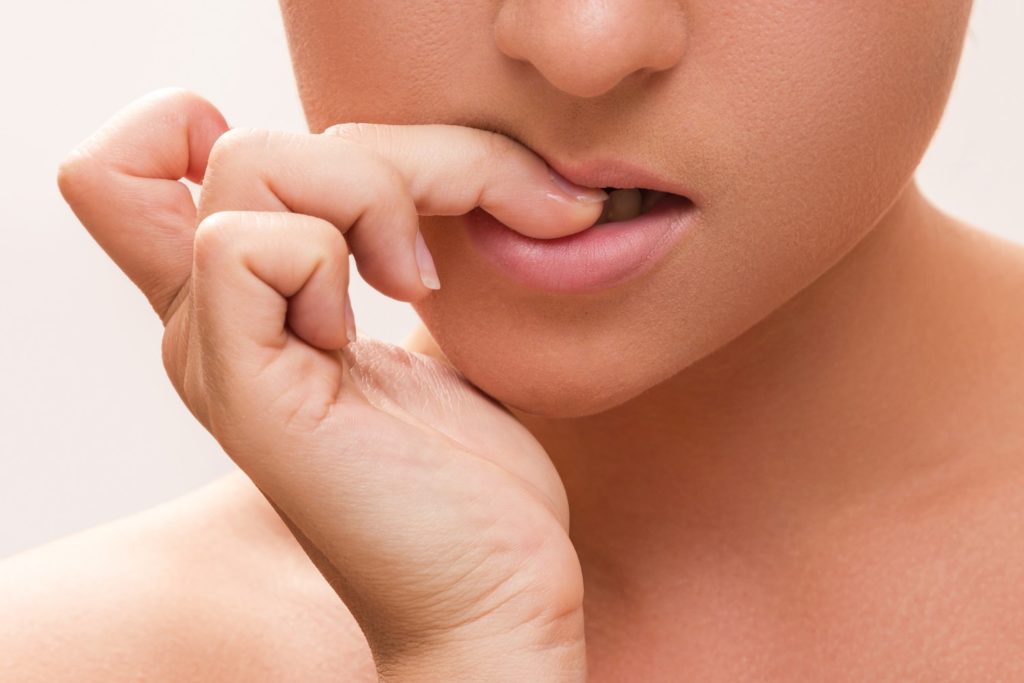If you find your fingers creeping towards your mouth when you’re stressed out, nervous, or just plain bored, you’re not alone! Nail biting is a very common habit, with some figures estimating that close to half of us have chewed our nails at one point or another in our lives. Though it usually begins in early childhood and is something we tend to outgrow over the years, many people find themselves struggling to break their nail biting habit in adulthood.
Jagged nails and unsightly cuticles can be annoying side effects of chewing your nails, but your teeth can suffer, too. And if you’re an orthodontic patient, this bad habit can rough up your braces as well. It can even lead to broken brackets or bent wires, not to mention worsening any misalignment you’re already experiencing. The additional pressure it causes can also weaken the roots, and slow the prescribed movements of your teeth. This can add extra time to the overall orthodontic process.
Here at Dillehay Orthodontics, your overall oral health is important to us. Nail biting can not only leave your fingers irritated and slow down your treatment, it can also increase your risk for developing bruxism, the unintentional grinding of your teeth. Bruxism can lead to tooth sensitivity, receding gums, headaches, facial pain, and even tooth loss. Do you need even more reasons to drop this habit? We’ve outlined several below, and added a few tips on how to successfully stop biting your nails!
Nail biting can wear down your teeth
Biting your nails regularly creates continuous stress on your teeth. This can lead to a breakdown in the enamel, which is the protective outer layer of the teeth. Even though enamel is the hardest tissue in the body, it won’t grow back once it’s gone, and a loss of enamel can eventually cause tooth erosion. Wear and tear on your teeth over time can also cause further misalignment.

Nail bitingcan cause chipped teeth
The stress that comes from biting your nails can crack, chip, or wear down the front teeth. If you’re a braces patient, this may put your teeth at an even greater risk for root resorption, which is a shortening of the roots, or even tooth loss, since your braces are already putting increased pressure on the teeth.
Nail biting can cause problems with your jaw
Excessive nail biting can put undue stress on your jaw, which, like any other joint, is susceptible to excessive strain. If this is left untreated over time, you can develop issues such as temporomandibular joint disorder, or TMD, which causes pain in the jaw, as well as headaches, muscle pain in the neck and face, noisy joints, and locking of the jaw. It can be a pretty miserable experience so it’s worth avoiding it if you can.
Nail biting may affect your overall health
Your nails are a perfect hideout for germs, and everybody knows your hands are a hotbed for them. Handwashing is our first line of defense against illness, and that’s because our hands and fingers pick up hitchhiking germs whenever we touch something. Putting your hands in your mouth throughout the day to bite your nails increases your chance of catching a rogue illness. Biting your nails can also damage the skin around them, giving germs an even easier way to infect you.
How to stop your nail biting habit
Knowing the nasty side effects that can come with a nail biting habit doesn’t necessarily make it any easier to kick it. It often develops into a bit of a coping mechanism, so giving it up can be a difficult task. The good news is, a little perseverance and patience can go a long way since breaking a habit only takes about 21 days! Here are a few ways to overcome the impulse.
Nail down your triggers
Take some time to think about what your nail biting triggers are – stress? Anxiety? Boredom? Annoying hangnails you can’t seem to leave alone? Getting to the heart of your habit will help you break it, and also give you a good start on finding other ways to cope.
Keep your nails looking nice
Keeping your nails short, neat, and looking nice by getting regular manicures can be an effective place to start when you’re trying to avoid putting your fingers in your mouth. When you’ve invested time and money into making your nails look nice, you’re a lot more likely to leave them alone.
Find your inner zen
Nail bitingis often an attempt at stress relief, so look for other ways to manage your anxiety, such as yoga, deep breathing, or meditation. A stress ball or fidget spinner can also be helpful for anxiety as well as boredom. Chewing gum is a great alternative to biting your nails, too. Just remember, the busier you keep your hands and mouth, the less time and temptation you’ll have to indulge in your nail biting habit!

Keep your smile looking and feeling great with Dillehay Orthodontics
When it comes to eliminating nail biting, remember that Rome wasn’t built in a day. You don’t have to go cold turkey if it’s easier to set small goals for yourself. If you can go without biting your nails for a day or two, you can do it for a day or two more after that! Manicures, rings, or bracelets are a great motivation to keep your hands out of your mouth, so reward yourself when you hit a new milestone. Keep in mind it only takes three weeks to break an old habit and make a new habit stick, so even if you fall off the wagon and chew on a nail or two, you can get right back on and try again!
Whatever the reason for your nail biting habit, it’s important to consider the toll it could be taking on your dental health. If you’re a chronic nail biter, we invite you to schedule an appointment with one of our doctors to learn more about the effects it can have on your orthodontic treatment, as well as your overall oral health. Our team cares about you and your smile, and we’re happy to help you kick the nail biting habit!
